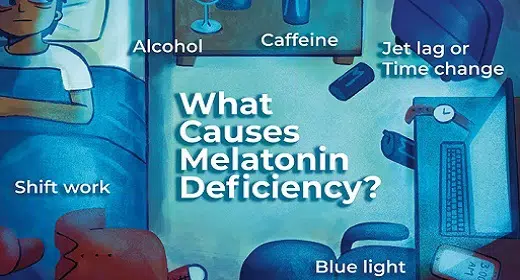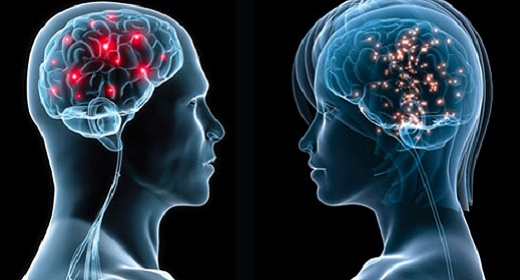by Kristen Fuller, MD: A sleep hormone produced in response to darkness…
Melatonin, commonly referred to as the “sleep hormone” is a natural hormone your body produces in response to darkness. It is responsible for the timing of your circadian rhythm, also known as your sleep-wake cycle, and therefore plays an integral role in falling asleep, staying asleep and awakening.
How Melatonin Is Produced in the Body
Melatonin
Melatonin is a sleep hormone produced throughout your body but is primarily produced in the pineal gland in your brain.
The pineal gland is a tiny structure located in the deep center of the brain and was once known as the “third eye” because of its important connection to light.
The production and release of melatonin peaks during the night and is lowest during the day. It can be inhibited by a bright light during nighttime and therefore can throw off your sleep-wake cycle if you are exposed to bright lights during the night, think living in Alaska or working a nightshift.
How Melatonin Travels Through the Body
Once melatonin is produced in the pineal gland, it is sent into the bloodstream and cerebrospinal fluid (the fluid around the brain and spinal cord) and results in signaling to the body’s distant organs such as the liver, stomach, kidneys, and pancreas.
Melatonin is carried from the brain to the rest of the body via circulating blood. Organ tissues express signaling proteins known as receptors that are specific to melatonin. These receptors detect high and low concentrations of melatonin throughout the body and are able to convey to the body and brain that it is either night or day.
High levels of melatonin coordinate with nighttime whereas low levels of melatonin coordinate with daytime.
Nighttime concentrations of melatonin are at least 10 times higher than daytime concentrations. Melatonin levels also have a seasonal (or circannual) rhythm, with higher levels in the fall and winter, when nights are longer, and lower levels in the spring and summer, when nights are shorter.
Impact of Melatonin
In many animals, specifically in mammals and birds, melatonin is used for the regulation of the body’s seasonal functions such as mating behavior, coat growth, and reproduction in response to changing day length (think hibernation and spring offspring).
Melatonin may have multiple roles in humans, many of which are not fully understood. The primary role that has been studied in humans relates to sleep and wakefulness. Nocturnal melatonin levels peak between ages one to three years old, plateau throughout early adulthood, and steadily decline in later adulthood.1
A 70-year-old individual will only have a quarter of the melatonin amount compared to a young adult. These levels could possibly contribute to the reason why newborns and toddlers require many more hours of nightly sleep compared to an elderly adult.
What Happens When Your Body Is Depleted of Melatonin?
Naturally, your body will produce sufficient amounts of melatonin for a healthy sleep-wake cycle. Unfortunately, modern lifestyle changes can play a role in causing insufficient melatonin production, which can cause you to have problems falling asleep or waking up in the morning feeling tired and groggy.
The following factors play a role in melatonin deficiency:
- Blue light in the evening
- Time changes/jet lag
- Shift work
- Caffeine
- Alcohol
Blue Light in the Evening
Artificial blue light, primarily from electronics with a high blue light component (460-480 nanometer wavelength) reduces the release of melatonin.2
Light from televisions, computers, and smartphones, is known to play a large factor in poor sleep due to nighttime melatonin deficiency.
A good rule of thumb is to turn off all electronics at least two hours before bed.3
Time Changes/Jet lag
Flying through different time zones or even the annual changeover of summer and wintertime can mess up your sleep-wake cycle.
The production of melatonin is slowly produced and adapted to the new time but generally takes a few days.
In order to combat jet lag, go to sleep during regular nighttime hours at your destination time, even if it is daytime where you came from. You may need to take supplements to help induce sleep when this most likely will not be natural.
Shift Work
Frequent switching between different nighttime and daytime working hours can unbalance the biorhythm and cause a shift in melatonin production. If your job requires shift work, try to maintain a regular sleep-work schedule.
Caffeine
If you consume caffeinated beverages such as coffee, tea, soda, or energy drinks late in the day, the caffeine contained in them can affect the production of melatonin.
Caffeine has a half-life of about four hours and therefore it is recommended you stop drinking caffeine by noon in order to obtain the best night’s sleep.4
Alcohol
Alcohol has an unfavorable influence on your sleep-wake cycle. It can help induce sleep but will increase your nighttime awakenings, leaving you feeling exhausted in the morning. As a rule of thumb, avoid alcohol before bed.
Melatonin Supplements
It is nearly impossible to go into a pharmacy or walk down the medication aisle of a grocery store without running into melatonin supplements.
In the United States, melatonin is considered a dietary supplement. This means that the Food and Drug Administration (FDA) regulates it less strictly than a prescription or over-the-counter drug.
In several other countries, melatonin is available only with a prescription and is considered a drug. Your body actually makes enough melatonin to induce sleep, but you are probably sleep deficient because of your lifestyle choices and poor nighttime routines rather than your melatonin production. Think caffeine, diet, exercise, alcohol, sleep hygiene, morning routines, etc.
However with that said, melatonin dietary supplements can be beneficial in very specific disorders including:
- Jet lag
- Delayed sleep-wake phase disorder
- Sleep-wake disorders in children
- Anxiety before and after surgery
Melatonin supplements do not show benefits for insomnia or shift work but this area still remains controversial as many individuals use melatonin supplements for these purposes.5
Insomnia is best treated with cognitive-behavioral therapy in combination with specific prescription medications whereas shift workers can obtain the best sleep through lifestyle modifications.
Recent research studies are exploring whether melatonin might improve cognitive impairment in individuals with Alzheimer’s disease and prevent cell damage associated with amyotrophic lateral sclerosis (ALS).6
Melatonin supplements are generally safe for short-term use. Unlike many sleep medications, melatonin has a low addiction and physical dependence risk profile. You are less likely to develop a tolerance, have a diminished response after repeated use (habituation), or experience a hangover effect.
The most common melatonin side effects include:5
- Headache
- Dizziness
- Nausea
- Drowsines
Uncommon side effects include:5
- Depression
- Anxiety
- Irritability
- Decreased alertness
- Confusion










































